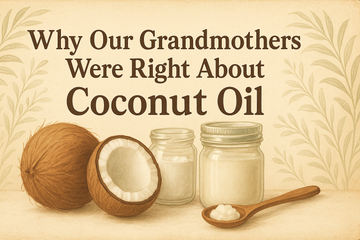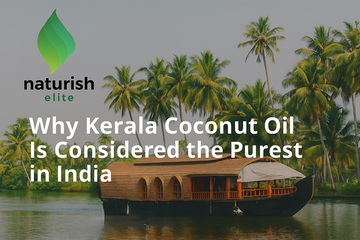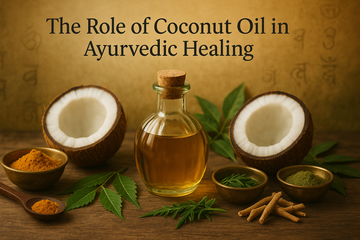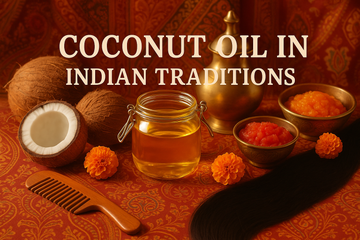The Relationship Between Kerala’s History and Coconut Oil
Coconut and coconut oil are deeply interwoven with the history and identity of Kerala. In fact, the very name Kerala is derived from Kera, the Malayalam word for coconut—thus, Kerala literally means "the land of coconuts."
The coconut tree holds such immense value in the region that it is often referred to as "Kalpa Vriksham" or the "tree of heaven," signifying that every part of it is useful in some way. From root to leaf, it supports everyday life—offering food, shelter, medicine, and livelihood.

Thanks to its lush tropical coastline and humid climate, Kerala has always been ideal for coconut cultivation. Over centuries, the tree became a cornerstone of Kerala’s agrarian economy, traditional cuisine, Ayurvedic healing practices, and spiritual rituals.
Coconut oil, traditionally extracted using cold-pressed methods, is more than just a cooking ingredient. It has played a vital role in household remedies, beauty rituals, and preventive healthcare passed down through generations. Even today, it remains a symbol of Kerala’s rooted, sustainable, and health-conscious way of life.
Kerala’s Traditional Cuisine: A Celebration of Coconut and Coconut Oil
Kerala’s traditional food is inseparably woven with the richness of coconut and the aroma of cold-pressed coconut oil. From breakfast to dessert, coconut appears in every form—grated, ground, as coconut milk, or as oil. Signature dishes like appam with vegetable stew, puttu with kadala curry, and avial are all enriched with the natural sweetness of fresh coconut. Cold-pressed coconut oil is not just a cooking medium but a flavor enhancer that brings authenticity to every meal.
Daily staples such as thoran (stir-fried vegetables with grated coconut), spicy coconut chutneys, and payasam (a traditional dessert made with coconut milk and jaggery or sugar) highlight the ingredient’s versatility. This deep-rooted use of coconut reflects Kerala’s coastal abundance and the cultural reverence for the coconut tree—rightly earning the state its name, derived from “Kera,” meaning coconut. In every home-cooked meal, the legacy of Kerala’s coconut-rich heritage continues to thrive.
KERALA HOME LIFE
Life in a traditional Kerala home is deeply rooted in simplicity, cultural rituals, and a close connection with nature. The daily rhythm revolves around family, food, and spiritual practices. Mornings usually begin with lighting the nilavilakku (traditional lamp) and offering prayers, creating a serene and sacred start to the day. This is followed by a wholesome breakfast, often featuring traditional dishes like idli, puttu, or appam.
Most homes are nestled among coconut trees, with backyard gardens that flourish with curry leaves, banana plants, medicinal herbs, and seasonal vegetables—reflecting a self-sustaining lifestyle. During festivals or family gatherings, meals are traditionally served on banana leaves, a practice that symbolizes respect for nature and cultural heritage. Kerala home life beautifully blends the warmth of community with the rhythm of the natural world.
Grandmother’s Role in a Traditional Kerala Home
In a Kerala household, the grandmother—fondly called Ammamma or Muthassi—holds a central and revered place in the family. She is not just an elder but the living repository of tradition, wisdom, and cultural heritage. From preparing authentic meals with coconut oil and hand-ground spices to narrating folk tales and lullabies, her influence shapes the emotional and cultural fabric of the home.
Grandmothers often guide important family decisions and offer emotional stability with their calming presence. They nurture grandchildren with love, instilling values, discipline, and stories of the past. Their role extends beyond caregiving—they are often the silent custodians of age-old home remedies, prayer rituals, and herbal knowledge passed down through generations.
How Kerala Grandmothers Used Coconut Oil in Their Cooking
In traditional Kerala households, grandmothers (Ammammas or Muthassis) treated coconut oil not just as a cooking medium, but as a vital part of health, flavor, and heritage. Cold-pressed coconut oil was the base of almost every meal, starting with the classic method of thaalikkuka—tempering spices like mustard seeds, curry leaves, dry red chilies, and urad dal to release their full aroma and flavor.

From iconic dishes like avial, thoran, kaalan, and meen curry to simple stir-fries, coconut oil gave Kerala cuisine its distinctive taste and richness. Grandmothers often finished vegetarian dishes with a spoon of raw coconut oil just before serving—a traditional technique believed to improve digestion and enhance the dish’s aroma naturally.
Beyond everyday meals, Kerala grandmothers also used coconut oil in preparing a wide variety of homemade snacks. Their choices reflected a perfect blend of taste, nutrition, and time-tested tradition. From crispy banana chips to crunchy murukku and soft unniyappams, cold-pressed coconut oil was their trusted companion in the kitchen, ensuring both purity and authenticity.
1. Banana Chips (Upperi / Kaya Varuthathu)
-
How it's made: Raw Nendran bananas are sliced thinly and deep-fried in pure coconut oil

2. Sharkkara Varatti (Jaggery-coated banana chips)
-
How it's made: Fried banana chips are tossed in a jaggery syrup with ginger and cardamom.
-
Coconut oil use: Used both in frying and slightly greasing hands/tools to prevent sticking when mixing with jaggery.

3. Unniyappam
-
How it's made: A batter of rice flour, mashed banana, jaggery, and coconut bits is poured into a special pan (appakarai) and fried in coconut oil.

4. Achappam (Rose Cookies)
-
How it's made: A semi-thin batter of rice flour, coconut milk, and eggs is fried using a metal mold dipped in hot coconut oil.

Coconut Oil: The Grandmother’s Natural Shield in Kerala Homes
In traditional Kerala households, grandmothers regarded coconut oil as far more than just a cooking ingredient—it was a natural guardian of health, home, and everyday life. For them, coconut oil was woven into daily rituals, valued for its healing touch and protective qualities.
It began with care: warm coconut oil was gently massaged onto infants, believed to strengthen bones, improve blood circulation, and prevent skin infections. This wasn’t limited to babies—children and adults alike received full-body massages before bath time, especially during cooler seasons, for vitality and immunity. Grandmothers also massaged coconut oil into the scalp and hair, trusting it to promote deep sleep, reduce dandruff, and encourage hair growth. Modern science supports many of these practices, with lauric acid in coconut oil known for its powerful antimicrobial and nourishing properties.
Their wisdom extended beyond body care. Coconut oil was used to preserve and protect household essentials. A light coat was rubbed on wooden ladles, cutting boards, and earthenware pots to prevent drying, cracking, and bacterial buildup. Even in food presentation, their knowledge showed—banana leaves used to serve hot meals were brushed with oil at the edges to prevent sticking and tearing.
For Kerala grandmothers, coconut oil was a symbol of care, cleanliness, and continuity—one that nourished both body and home, season after season.
FAQs
1. Why was coconut oil considered so important in traditional Kerala homes?
Answer:
Coconut oil was central to daily life in Kerala due to its versatility, health benefits, and cultural significance. It was used in cooking, body and hair care, infant massages, and even to preserve utensils and cookware. Grandmothers believed it promoted immunity, digestion, and emotional well-being.
2. How did Kerala grandmothers use coconut oil in their cooking?
Answer:
Kerala grandmothers used cold-pressed coconut oil as a base for cooking, starting with tempering spices like mustard seeds and curry leaves. They believed finishing dishes like avial or thoran with raw coconut oil enhanced aroma and aided digestion.
3. What snacks were traditionally made using coconut oil in Kerala homes?
Answer:
Some of the beloved snacks prepared in coconut oil include:
-
Banana chips (Upperi) – deep-fried in coconut oil.
-
Sharkkara Varatti – jaggery-coated banana chips.
-
Unniyappam – It's making with rice floor and jaggary/Sugar fritters fried in coconut oil.
-
Achappam – crispy rose cookies made with coconut milk.
-
Murukku and Aval Vilayichathu – fried or roasted treats rich in tradition.
4. How did grandmothers in Kerala use coconut oil for health and protection?
Answer:
Coconut oil was used as a daily body and hair oil, especially for babies and children. Warm oil massages were believed to improve blood circulation, strengthen bones, and soothe the skin. It was also applied to the scalp to aid sleep and reduce dandruff.
5. What is the cultural significance of coconut oil in Kerala rituals and lifestyle?
Answer:
Coconut oil goes beyond utility—it is spiritually and culturally woven into Kerala life. It is used to light nilavilakku (lamps) during morning prayers, in festive meals, Ayurvedic remedies, and even temple rituals.






